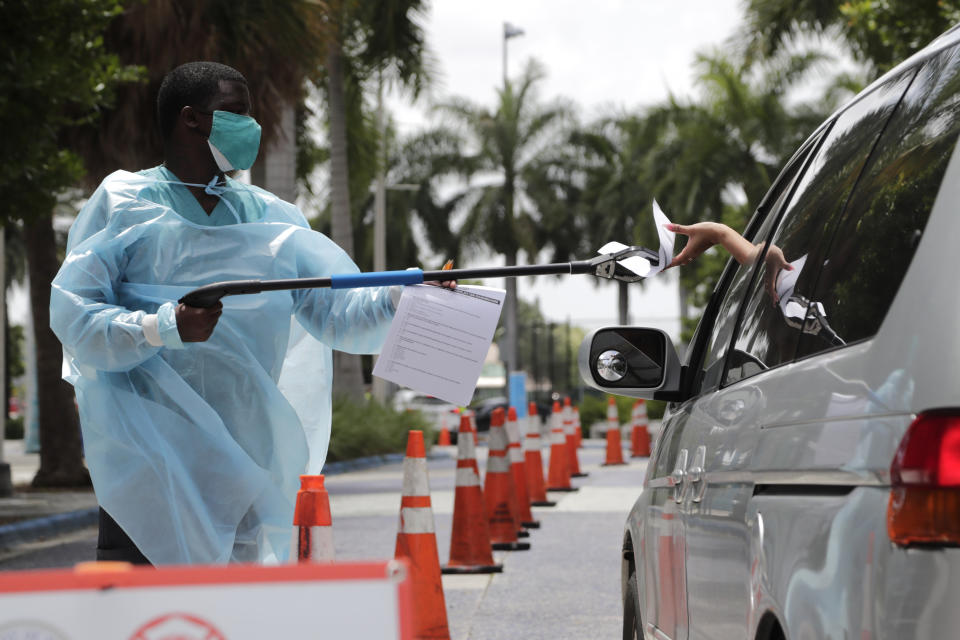Miami-Dade ICUs at 146% capacity with coronavirus patients, according to federal document
WASHINGTON — Hospitals in the Miami area have been so overwhelmed by coronavirus patients that intensive care units are now operating well beyond full capacity, according to a federal pandemic update obtained by Yahoo News.
The information comes from the “senior leadership brief” for July 27 prepared by the Department of Health and Human Services, or HHS, and distributed to federal agencies involved in the pandemic crisis. The document includes detailed analyses on various aspects of the crisis, from emerging hot spots to supply chain updates.
In the section titled “Medical care,” the document notes that in Florida, “hospitalizations increased 79% since July 4, with 8,974 current COVID-19 patients; ICU beds in Miami-Dade County at 146% capacity.”

When a hospital runs out of intensive care beds, it must make space in other departments.
The document also reported “hospitals reaching capacity” and an emergency response system “under strain” in Georgia, as well as diminishing hospital capacity in South Carolina, Louisiana and Texas. Those states reopened more eagerly than their counterparts in the Northeast and the Pacific Northwest, and have recently experienced high coronavirus case counts.
As a consequence, the governors there have seen their approval ratings drop.
Florida has proven especially concerning because of its large elderly population, which gives it the high median age of 42 (the median age nationwide is 38). Although the state’s 691 nursing homes had appeared to have been spared, the coronavirus is now making inroads there.
“We at HHS and others in the task force are very concerned about COVID spread in Miami and in other hotspot areas in the country,” a spokesperson for the department said, adding that the Trump administration had some 180 testing sites in the Miami area and was deploying teams of “epidemiologists, public health officers and other field representatives who leverage ground truth to validate data of what is happening, meet with community groups to determine possible root causes and assist local public health leaders to design a plan of action that will immediately reduce the impact of the virus.”
Concerns about hospital beds in Florida have been building for some time, but the internal Trump administration document suggests that the problem is more severe than had been previously thought. Those concerns have been compounded by allegations that Gov. Ron DeSantis’s administration is manipulating or hiding data about the pandemic.
The state’s dashboard shows that 5,328 people are hospitalized for the coronavirus in Miami-Dade. Until recently, DeSantis refused to make hospitalization data available.
There had been hopes that Florida was past the worst, but those hopes have been tempered in the last two days, with the state reporting consecutive fatality records, with 186 deaths on Tuesday and 217 on Wednesday. DeSantis, a Republican acolyte of President Trump, has come under growing criticism for his handling of the pandemic.
Also on Wednesday, the state’s Agency for Health Care Administration reported that 51 hospitals across the state had no ICU capacity whatsoever.
A spokesperson for the agency said it was in “frequent communication with hospital leadership with regard to the amount of beds that can be converted to allow additional bed availability. Hospitals plan and prepare for surges, although that additional capacity is not reflected on the dashboard. Some hospitals have discontinued elective procedures as a way to increase bed capacity.”
Officials in Miami-Dade said they had confidence in their own statistics, which differ from those on the federal document. “We can’t speak for HHS numbers,” Myriam Marquez, a spokeswoman for Miami-Dade Mayor Carlos Gimenez, told Yahoo News. “They are not shared with County,” she wrote in an email.
The county publishes its own coronavirus updates, which as of Wednesday morning showed that the county had a 30 percent availability for both ICU and non-ICU beds. The state’s hospital agency, for its part, says Miami-Dade has a 17.5 percent ICU capacity. The different numbers may reflect discrepancies in reporting and collecting data.
DeSantis has insisted that the state does not have a problem with hospital capacity. On Monday, he hosted Vice President Mike Pence at the University of Miami. In his remarks, DeSantis argued that his administration was successfully beating back the coronavirus.
“We’re encouraged by the most recent trends,” DeSantis said. “Yesterday, hospital admissions in the state of Florida for COVID-like illness was the lowest it’s been since June. Emergency department visits for COVID-like illness yesterday was as low as it’s been since the middle of June.”
Downplaying suggestions of overcrowding or undersupply, DeSantis said that hospitals were achieving “incredibly great results.”
Additional reporting by Jana Winter.
_____
Read more from Yahoo News:



